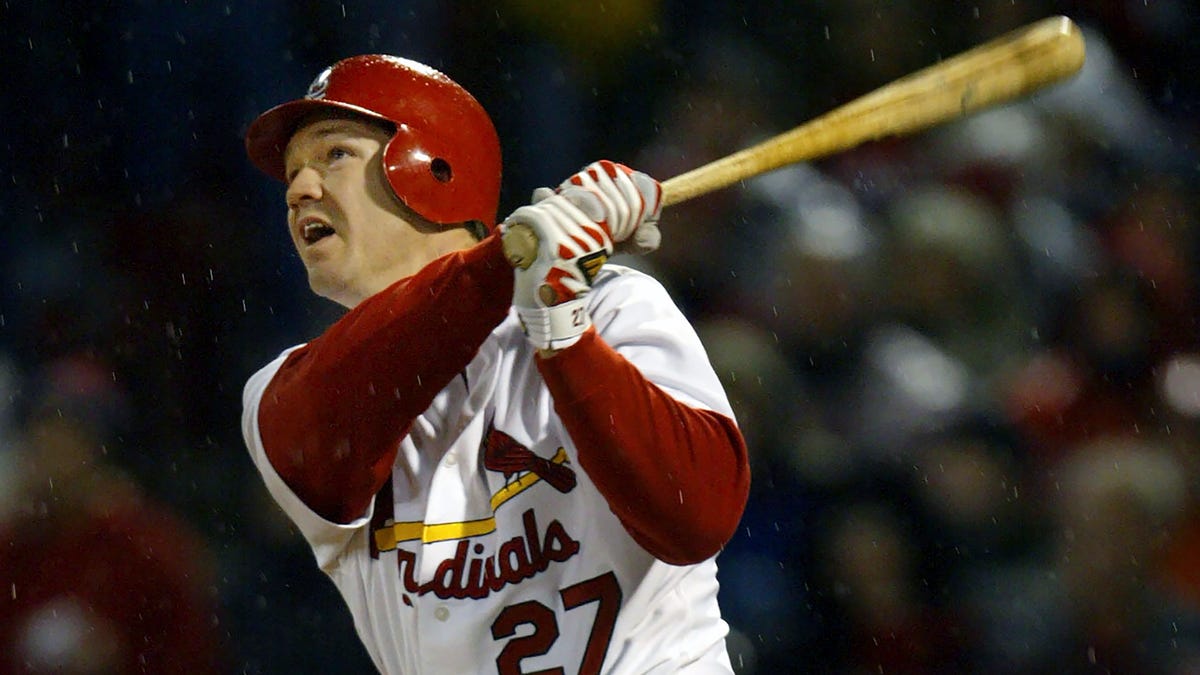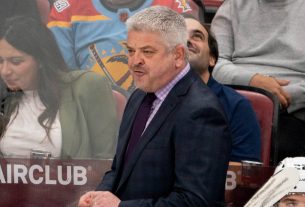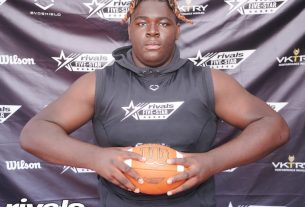Unlike most sports’ Hall of Fame votes nowadays, the Major League Baseball Hall of Fame voting process has been the subject of much analysis, scrutiny, and often ridicule in recent years. There isn’t another major sport with so much elitism that all-time great players aren’t offered immortality via enshrinement. Regardless, the 2023 Hall of Fame class was always considered weak, and many believed it would’ve taken a miracle for anyone to get into Cooperstown after guys like Barry Bonds, Roger Clemens, and Curt Schilling were all cleansed from the ballots last season. Alas, we did see one new inductee.
Why Scott Rolen was elected
Former Philadelphia Phillies and St. Louis Cardinals third baseman Scott Rolen became just the 18th third baseman to be elected into the Hall of Fame by the Baseball Writers’ Association of America (BBWAA). That’s the fewest for any position outside of designated hitter.
Rolen was a seven-time All-Star and eight-time Gold Glove Award winner; he also was part of the 2006 St. Louis Cardinals’ World Series team. Rolen, in his sixth year on the ballot, had steadily climbed the ranks, from receiving just 10.2 percent of the vote in 2018 to 35.3 percent in 2020, and finally 76.3 percent in 2023.
Elected after six years on the ballot
But what about this season finally pushed voters over the edge? Why was this the year that Rolen earned induction? I think the answer is pretty obvious actually. See, BBWAA voters are only allowed to vote for a maximum of 10 players every year. While voters are not required to check 10 boxes — many opted to check only one this year — this restriction is in place to prevent voters from letting everyone in. In recent years, the voting committee has been relatively split on players with checkered pasts. In their final years on the ballots, Barry Bonds, Roger Clemens, and Sammy Sosa each received 260, 257, and 73 votes respectively. While some of those voters could have also checked Rolen’s name on their ballots, there’s still a large likelihood that several voters were forced to leave Rolen off in order to make room for these three, who ultimately did not receive enough votes for a Hall of Fame induction. Now, in 2023, with such a weak class surrounding him, Rolen was a no-brainer for most BBWAA members, which is good considering the strength of the 2024 class.
G/O Media may get a commission

Addiction counseling
Safe Haven Health
Accessible for all
Safe Haven prioritizes your needs with flexible and individuated substance abuse treatment, specifically opioid & alcohol addiction.
The 2024 Class, led by Adrián Beltré, is loaded
Next year’s Hall of Fame class is absolutely loaded. You want a sure-fire first-ballot Hall of Fame player? BAM! Look no further than Adrián Beltré. He’s got 3,166 career hits, 477 career home runs, and a .286 career batting average during his 21-year career with the Los Angeles Dodgers, Seattle Mariners, Boston Red Sox, and Texas Rangers. Couple those offensive numbers with solid defense at third base, the third-highest WAR total for third basemen ever — behind only Mike Schmidt and Eddie Mathews — and zero controversies or scandals attached to his name, and you’ve got yourself potentially the first player to eclipse 80 percent of the Hall of Fame vote since Derek Jeter in 2020.
You want former MVPs? There’s former Minnesota Twins backstop Joe Mauer. World Series champions? There’s Chase Utley and Matt Holliday. Cy Young winners? There’s “Big Sexy” Bartolo Colon, although he does have a PED suspension attached to his name. The reality of the situation is that, aside from Beltré, there are so many newcomers who could warrant remaining on the ballot for years to come. I never even mentioned Adrián González, José Reyes, José Bautista, Victor Martinez, or David Wright. These are all players that probably won’t ever reach the Hall of Fame, but will all tug on certain voters’ heartstrings, taking potential votes away from arguably more deserving players down the road. If Scott Rolen didn’t get in this year, I’d hesitate to think he would’ve reached the 75 percent threshold in 2024 given that Beltré would’ve been the best third baseman on the ballot. Would Rolen have gotten in later? Probably, but his induction could’ve been delayed two or three years if 2023 didn’t pan out for him.
Jeff Kent not elected, blames “stat folks”
2023 was the final shot for 2000 NL MVP Jeff Kent. Unfortunately, the five-time All-Star only accrued 46.5 percent of the vote, coming nowhere close to the 75 percent requirement. In all fairness, it was the highest percentage Kent had ever received. In fact, it was more than ten percent more than he received just a year prior in 2022 (32.7 percent). Now, if you ask me, I believe Kent boasted Hall of Fame credentials. A power-hitting second baseman is such a rare site no matter what era of baseball you look at. Kent is the position’s all-time home run leader with 377, and anybody who overshadows Barry Bonds during the early 2000s deserves an immense amount of credit. He was a pretty poor defender, but like come on, the man was a .290 hitter with a 123 OPS-plus from second base. To put that in perspective, since Kent retired following the 2008 season, there have only been 41 instances where a second baseman has accrued a better OPS-plus in a single season than Kent’s career mark. Kent’s career-best OPS-plus was 162, when he was his MVP Award in 2000. Since 2009, absolutely zero second basemen have reached that mark. José Altuve came close in both 2017 and 2022, reaching 160 both times, but Kent reigns supreme.
Regardless of my thoughts on Kent’s Hall of Fame credentials, the BBWAA did not deem Kent worthy of Cooperstown. Did Kent take that disrespect in stride? No. Kent fell back on the oldhead excuse of blaming “nerds” in baseball. “The voting over the years has been too much of a head-scratching embarrassment,” said Kent in a text to the San Francisco Chronicle. “Baseball is losing a couple generations of great players that were the best in their era because a couple non-voting stat folks keep comparing those players to players already voted in from generations past and are influencing the votes. It’s unfair to the best players in their own era and those already voted in, in my opinion.”
As a self-proclaimed “stat folk,” Kent’s concerns are only slightly off-base in my opinion. Yes, several voters do compare Hall of Fame hopefuls to players already in the Hall of Fame, but that doesn’t mean they don’t look at each player’s impact in their own era. Stats like OPS-plus, weighted on-base average (wOBA), and weighted runs created-plus (wRC+) are all designed to determine how impactful a player was offensively in their own era. While my voice doesn’t mean anything to players looking to earn their way into Cooperstown, I know that these are basic figures that several “stats folks” look at when determining a player’s Hall of Fame viability. Instead of blaming how advanced statistics have become in baseball, maybe Kent should take a look back at his horrendous defense. Despite all his incredible offensive numbers, Kent still ranked 19th in WAR among all-time second basemen, well below the average of a current Hall of Famer, and that’s likely a huge reason why he was kept out of Cooperstown.
While Kent had many complaints, there were many players with reason to be excited about their chances moving forward, particularly Carlos Beltrán and Andruw Jones. I’ve been an enormous advocate for Jones’s induction. Lately, more people have been hopping on the train as well.
Andruw Jones is deserving of a spot in Cooperstown
With all this attention on Jones’s case, Jones skyrocketed from 41.4 percent of the vote in 2022 to 58.1 percent of the vote in 2023. Jones still has four years left on the ballot, and at this pace, he’ll get to that coveted 75 percent in no time.
I’m a little less excited for Beltrán, who received 46.5 percent of the vote in just his first year on the ballot. I’m not denying his Hall of Fame credentials, but given the voters’ unwillingness to look past Bonds’ and Clemens’ histories of cheating, I find it concerning that Beltrán earned such a high percentage despite his involvement in the Astros’ 2017 cheating scandal. If Beltrán does eventually reach the Hall, his induction will signal to future players that it’s okay to cheat, or even win a World Series through those illegal methods as long as it doesn’t involve PEDs. It would set an awful precedent and would be a textbook example of hypocrisy. That said, I fully expect Beltrán to be a Hall of Famer by the end of his 10 years on the ballot.
Is that right? I don’t think so, but it doesn’t matter what I think, only what the voting committee thinks come this time in 2024. Here’s to a much more consistent future for the Hall of Fame, even if it likely won’t ever come.



